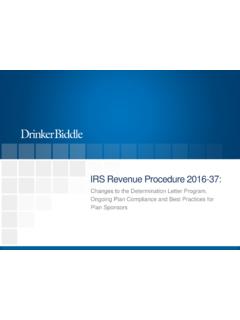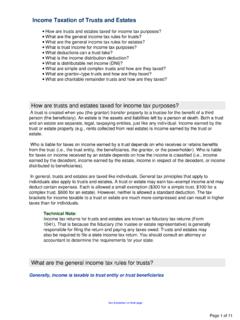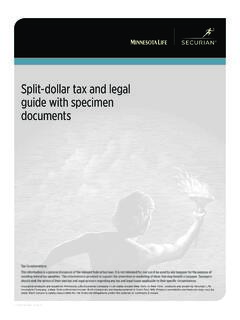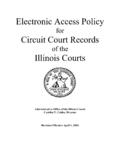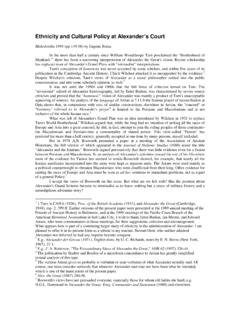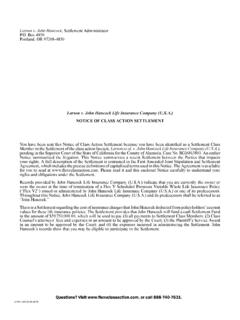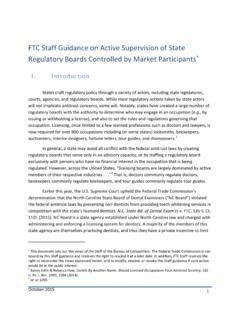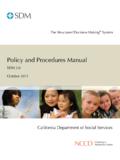Transcription of MASSACHUSETTS SUPREME COURT TAKES …
1 _____ MASSACHUSETTS SUPREME COURT TAKES tough STANCE ON VACATION PAY BY: GEORGE L. CHIMENTO JUNE 15, 2009 _____ 1. INTRODUCTION MASSACHUSETTS employers should review their vacation and paid time off ( PTO ) policies, to be sure they comply with a recent MA SUPREME COURT decision, Electronic Data Systems Corporation vs. Attorney General & Another, SJC 10260 (the Decision ). 1 The COURT ruled that EDS, a MASSACHUSETTS employer, must pay for accrued vacation time when it terminates an employee. An employer policy which defined unused vacation time as unearned and forfeitable was declared void. The COURT upheld an Attorney General citation requiring EDS to pay the vacation accruals plus a 20 0% penalty. This article reviews the Decision, and what employers should do so that they administer vacation and PTO policies appropriately in MASSACHUSETTS .
2 It points out the questions which are still unanswered. Finally, it reviews failed attempts to structure vacation policies as ERISA plans, so that they might be exempted fr om state law requirements. 2. THE STATUTE AND THE ATTORNEY GENERAL S 1999 OPINION The material portions of c. 149. 148 (the Wage Act) provide: Every person having employees in his service shall pay weekly or bi weekly each such employee the wages earned by him to within six days of the termination of the pay period during which the wages were earned if employed for five or six days in a calendar ; and any employee discharged from such employment shall be paid in full on the day of his word wages shall include any holiday or vacation payments due an employee under an oral or written No person shall by a special contract with an employee or by any other means exempt himself from this section.
3 [emphasis supplied] 1 Note to lawyers: the Decision link is to the slip opinion. 1 The Decision defers to 1999 views of the MA Attorney General, expressed in Advisory 99 1 (the Advisory ): 1. If vacation time is part of the compensation package, the rights to it accrue just like other wages. 2. Unless another accrual schedule is specified, vacation time accrues daily in the time period in which the employee actually 3. If an employer terminates an employee with accrued vacation time, it must pay equivalent wages on the day of termination. The Decision also puts to rest an argument that the Wage Act was only meant to protect payment for vacation time that had been used, but not yet paid fo r, at the time of termination.
4 Although paid vacation is not required in MASSACHUSETTS , if it is granted, accrued rights to it are protected as earned wages. 3. THE COURT AGREES WITH THE CONCEPT OF USE IT OR LOSE IT EDS asked a good question in its argument. If vacation pay is earned and non forfeitable, why does the Advisory permit vacation carryover policies, which require employees to use accumulated vacation time by a certain period or to lose it? If an employer can grant vacation under a condition which permits it s loss under a carryover policy, is vacation truly an earned and non forfeitable wage? If a use it or lose it condition is acceptable, doesn t that mean that a right to paid vacation is not really earned pay at all, so why can t other conditions be added to its grant?
5 In order to address the EDS argument, the COURT had to opine on use it or lose it. The COURT adopted the reasoning of the Advisory, and ruled that use it or lose it policies are not inconsistent with the concept that accrued vacation pay is non forfeitable. As long as there is a reasonable period in which vacation time can be used, it is not a forfeiture if the vacation rights are lost due to the employee s decision not to take the time. Lawyers will note that other courts have concluded differently on this issue,3 but the law is now set in MASSACHUSETTS . Vacation time that can be lost under use it or lose it policies is still non forfeitable pay if an employee terminates. At least this part of the decision will be welcomed by employers. Use it or lose it vacation policies are confirmed in MASSACHUSETTS .
6 One caveat. The Advisory requires that employees receive adequate notice of use it or lose it features, and that employers must ensure that employees have a reasonable opportunity to use the accumulated vacation time within the time 2 The Advisory allows employers to designate non daily accrual schedules, such as crediting one vacation day at the end of each month, or capping the number of days that can be accrued in a period. 3 When analyzing a similar statute, the Minnesota SUPREME COURT decided that an employer s conditions on paying accrued vacation pay should be respected so that the validity of use it or lose it policies not be in doubt. It noted: ..many employers place a cap on the amount of vacation time employees may accrue, for reasons similar to the use it or lose it policies.
7 If we reached a different conclusion in this case, and held that employees have actually earned an absolute right to vacation pay as they accrue vacation hours for working each pay period, the legality of both the us e it or lose it policy and the cap on vacation time accrual policy would be called into question. See Lee v. Fresenius Medical Care, Inc. at p. 9. 2 limits. In thinly staffed work places, that requirement to ensure reasonable opportunity to use the forfeitable vacation time could be the basis for challenge. 4. VOLUNTARY QUITS ARE NOT COVERED BY THIS DECISION The Decision involved rights of an employee who had been terminated in a job reduction. As long as the COURT was dispensing extra wisdom about carry over vacation policies, it would have been great if it had slipped in another freebie.
8 If an employee quits (or quits without adequate notice), may an employer s policy deny payment for unused vacation days? The Advisory is clear that the reason for termination does not matter: Employees who have performed work and leave or are fired, whether for cause or not, are entitled to pay for all the time worked up to the termination of their employment, including any earned, unused vacation time payments. Justice Botsford, who wrote the Decision, did not reveal whether she agreed with the Advisory on this issue, and concluded her Opinion with a warning that the Decision was not intended to address the rights of a person who leaves a job voluntarily. It remains an open question, and the COURT s concern on this issue emanates from the plain English of the Wage Act.
9 It only protects employees who are discharged from employment. Any employee discharged from such employment shall be paid in full on the day of his discharge. Does discharge mean fired, or simply a departure from the employer s service and a discharge from further service obligations? Considering the adamant position of the Advisory, an employer TAKES a significant risk if it withholds vacation pay from an employee who has terminated, regardless of the reason. 5. PTO POLICIES The Decision only dealt with vacation days. Many employers have developed PTO policies and do not require an employee to differentiate between vacation, sickness, and other reasons when taking time off. The Advisory warns that unless the employer keeps records which differentiate the types of days, that they will probably all be considered vacation days that must be reimbursed if employment terminates.
10 Employers who provide annual leave instead of vacation leave should designate the amount of hours or days of the leave which are considered vacation time. Employers who have previously designated vacation time in this manner, whether orally or in writing, shall produce proof of such designation to rebut a complaint of unpaid wages pursuant to c. 149, s. 148. 3 It s not clear exactly what the Advisory means when it requires designation in advance. 1. Is that a general designation in advance of the year in which the services are performed? 2. Or is it a specific designation prior to the taking of each day of PTO leave? We understand that some employers follow approach #1 and simply allocate a reasonable vacation percentage to the PTO allotment.
